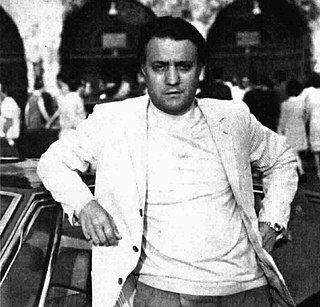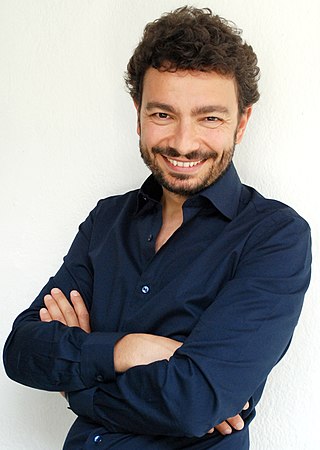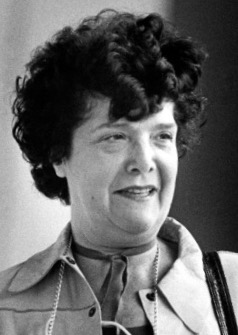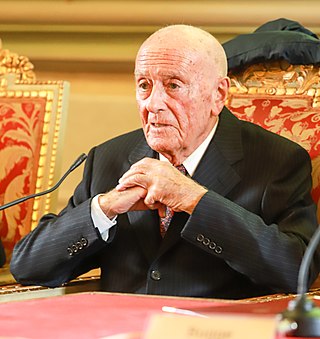Related Research Articles

Roberto Baggio is an Italian former professional footballer who mainly played as a second striker, or as an attacking midfielder, although he was capable of playing in several offensive positions. He is the former president of the technical sector of the Italian Football Federation. A technically gifted creative playmaker and set piece specialist, renowned for his curling free-kicks, dribbling skills, and goalscoring, Baggio is widely regarded as one of the greatest players of all time. In 1999, he came fourth in the FIFA Player of the Century internet poll, and was chosen on the FIFA World Cup Dream Team in 2002. In 1993, he was named FIFA World Player of the Year and won the Ballon d'Or. In 2004, he was named by Pelé in the FIFA 100, a list of the world's greatest living players.

Giampiero Boniperti was an Italian footballer who played his entire 15-season career at Juventus between 1946 and 1961, winning five Serie A titles and two Coppa Italia titles. He also played for the Italy national team at international level, and took part at the 1950 and 1954 FIFA World Cup finals, as well as the 1952 Summer Olympics with Italy. After retirement from professional football, Boniperti was a CEO and chairman of Juventus and, later, a deputy to the European Parliament.

Marco Pannella was an Italian politician, journalist and activist. He was well known in his country for his nonviolence and civil rights' campaigns, like the right to divorce, the right to abortion, the legalization of cannabis and the abolition of nuclear power. Internationally, he supported human rights and self-determination causes, like the Tibetan independence and persecution of Christians in Vietnam.

Piero Cappuccilli was an Italian operatic baritone. Best known for his interpretations of Verdi roles, he was widely regarded as one of the finest Italian baritones of the second half of the 20th century. He was enormously admired within the field of opera for his rich and abundant voice, fine vocal technique and exceptional breath control. In the great Italian tradition he fused words and music into elegant phrases. He focused on Italian repertory, particularly the operas of Verdi, singing 17 major roles.

Amedeo Amadei was a professional Italian football player and manager, who played as a striker. Following his death in 2013, he was one of eleven members to be inducted into the A.S. Roma Hall of Fame. A fast and powerful forward, with a good touch, he is considered to be one of the best Italian strikers of all time. Amadei was known for his ability to run forward with the ball from midfield and find spaces in the opposing defence, as well as his prolific goalscoring, acrobatic ability in the air, and precise volleying, which allowed him to excel in the centre-forward role; due to his importance to Roma throughout his career, he was affectionately known by the fans as the "eighth King of Rome".

Piero Domenico Angela was an Italian television host, science journalist, writer, and pianist.

Volume 1 is the second studio release by Italian singer-songwriter Fabrizio De André and his first true studio album. It was first issued in 1967 on Bluebell Records. It is a collection of re-recordings of De André's early singles, previously issued on the Karim label.
Piero Jahier was an Italian poet, translator and journalist.

Massimo Polidoro is an Italian psychologist, writer, journalist, television personality, and co-founder and executive director of the Italian Committee for the Investigation of Claims of the Pseudosciences (CICAP).

Alessandro Del Piero is an Italian former professional footballer who mainly played as a deep-lying forward, although he was capable of playing in several offensive positions. Since 2015, he has worked as a pundit for Sky Sport Italia. A technically gifted and creative supporting forward who was also a free-kick specialist, Del Piero is widely regarded as one of the greatest players of his generation and as one of the best players of all time. He won the Serie A Italian Footballer of the Year award in 1998 and 2008 and received multiple nominations for the Ballon d'Or and FIFA World Player of the Year.

Piero Sacerdoti was an Italian insurer and university professor, general manager of Riunione Adriatica di Sicurtà in Milan from 1949 to his death.
Franco Giraldi was an Italian director and screenwriter.

Piero Chiambretti is an Italian television presenter.

Guido Seborga, pseudonym of Guido Hess, was an Italian journalist, poet, painter and writer.

Leopoldo Longanesi was an Italian journalist, publicist, screenplayer, playwright, writer, and publisher. Longanesi is mostly known in his country for his satirical works on Italian society and people. He also founded the eponymous publishing house in Milan in 1946 and was a mentor-like figure for Indro Montanelli: journalist, historian, and founder of Il Giornale, one of Italy's biggest newspapers.
Piero Schlesinger was an Italian jurist, banker, lawyer and academic who served as president of the Banca Popolare di Milano from 1971 to 1993.
Corrado Lamberti was an Italian astrophysicist, science journalist and teacher. He was one of the most appreciated popularizers of astronomy in Italy, and along with Margherita Hack he headed the astronomy magazines L'Astronomia and Le Stelle.

Carla Voltolina, later Carla Pertini, was a journalist, Italian partisan, and psychotherapist. She undertook investigations into prostitution in Italy and provided therapy at hospitals and addiction-treatment clinics across Italy.
"Bella mia fiamma, addio", K. 528, is a concert aria by Wolfgang Amadeus Mozart for solo soprano and orchestra, composed in Prague in 1787. The text of this aria is taken from the 1772 opera Cerere placata, composed by Niccolò Jommelli with text by Michele Sarcone. The aria was published by Breitkopf & Härtel in 1881.

Mino Milani was an Italian writer, cartoonist, journalist and historian. During his career he also used several pseudonyms, including Stelio Martelli, Eugenio Ventura, Piero Selva, Mungo Graham Alcesti and T. Maggio.
References
- 1 2 3 Brunella Torresin (16 February 2016). "Mondo della cultura in lutto: addio a Buscaroli, musicologo controverso". La Repubblica . Retrieved 17 February 2016.
- 1 2 Augusta Cesari (17 February 2016). "Addio a Piero Buscaroli, con fierezza dalla parte dei "vinti" di Salò". Secolo d'Italia . Retrieved 17 February 2016.
- ↑ Redazione (17 February 2016). "Musica, è morto Piero Buscaroli". TGCOM . Retrieved 17 February 2016.